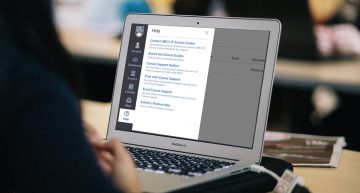
Starting July 8, instructors will have the ability to enable the ePub export feature in their Canvas courses. Once enabled, this feature allows you to export course content into an ePub file for viewing offline, using any eReader software.
This ePub export feature allows you to download course content in an easy-to-read format for viewing offline on any tablet, phone, or computer with eReader software. This means that if you have limited internet connection or may be travelling during the semester, you can still access course content anytime.
If you are experiencing barriers to accessing online classes and your instructor has not enabled the ePub export feature, we encourage you to discuss this option with them or contact a UBC Vancouver Enrolment Services Advisor.
UBC Okanagan students are advised to contact UBCO Student Services.
What is an ePub file and how do I open one?
An ePub file, or electronic publication file, is a popular file format used for storing eBooks and other types of content. ePub content is for offline viewing only; you cannot interact with course content directly, such as completing an assignment or viewing any submissions.
You can download a Canvas ePub file and upload it into any eReader software for viewing, such as iBooks or Azardi.
Here’s how you can download and view course content from Canvas offline as an ePub file.
What does a Canvas ePub file include?
In an ePub file, you can view modules, assignment details, quiz instructions, and content availability dates. Any files that aren’t supported in the ePub format (such as Word documents or PDFs) will be downloaded to a separate folder and can be viewed by the student in the file’s native environment.
Note: The ePub export will not include integrated tools like WeBWork, iPeer, Kaltura videos and LOCR.
Using the Library Online Course Reserves (LOCR)
Library course materials will not be included as part of an ePub file export. You can access licensed resources that have been reserved for your courses using the Library Online Course Reserves (LOCR) while connected to the internet.
We recommend accessing your course LOCR at the start of the semester, to ensure that you are able to access and download all necessary resources. These resources will no longer be accessible eight weeks after the last day of class for the term.
In most courses, you will access LOCR from Canvas.
How do I access LOCR from Canvas?
- Log in to your Canvas course, and click Library Online Course Reserves in the Course Navigation.
- You will be taken to LOCR. Click the course reserve item you want to access.
Appropriate Use of Course Materials
Adapted from the University of Saskatchewan .
While we understand that students may be interested in sharing resources to help one another in their course work, there are copyright-related implications of that sharing of which you should be aware.
Course Materials
Your course materials are provided to you based on your registration in a class, and any materials created by your professors and instructors are protected by copyright law. This includes exams, lecture slides and other course notes. Additionally, other copyright-protected materials created by textbook publishers and authors may be provided to you based on contracts, licences and educational exceptions in the Canadian Copyright Act.
Unless the materials have an open copyright licence attached to them (e.g., a Creative Commons licence), posting others’ copyright-protected materials on the Internet is not covered under the University of British Columbia Copyright Guidelines . If permission from the copyright holder is not acquired before posting their material online or distributing materials by e-mail this activity could be considered a copyright infringement.
Recording Lectures
Recording video and/or audio of your class lectures without permission from your instructor is not allowed.
If you do have recordings from your class lectures, it is not permitted for you to post those recordings online or to distribute the recordings to other people unless you have permission from your instructor to do so.
For more information about copyright at UBC, please visit copyright.ubc.ca or the Student FAQ .